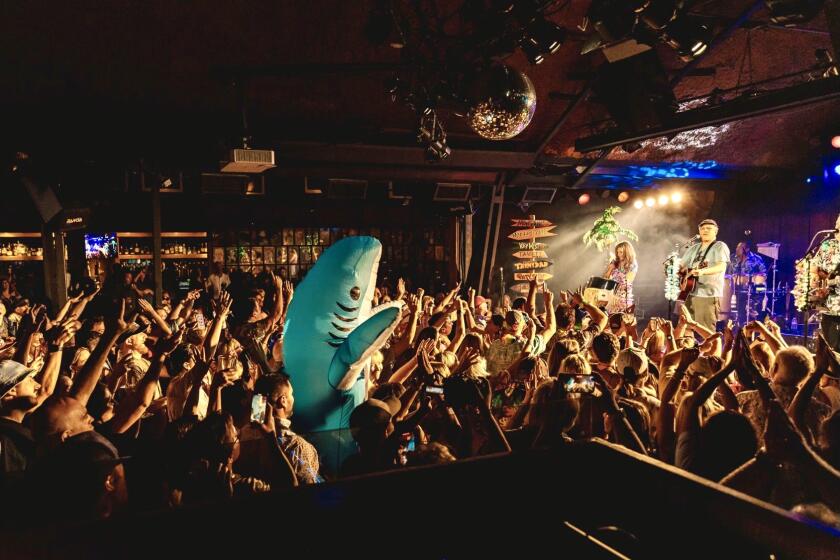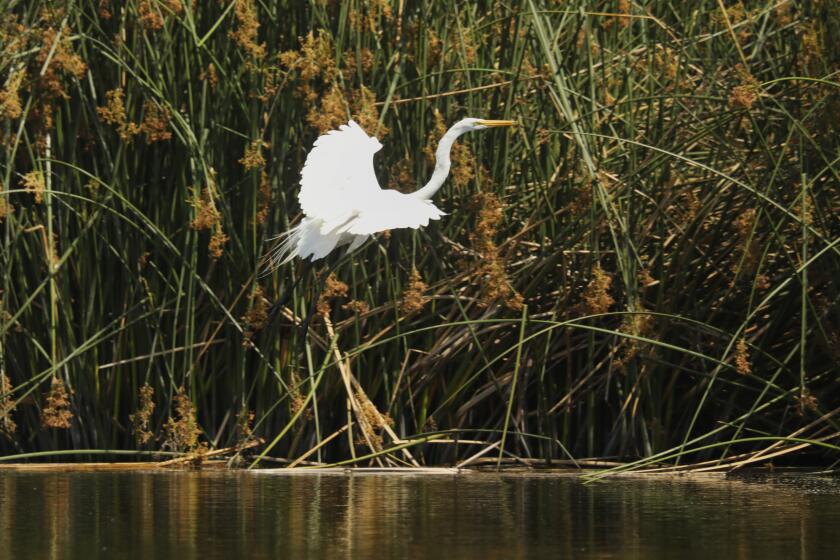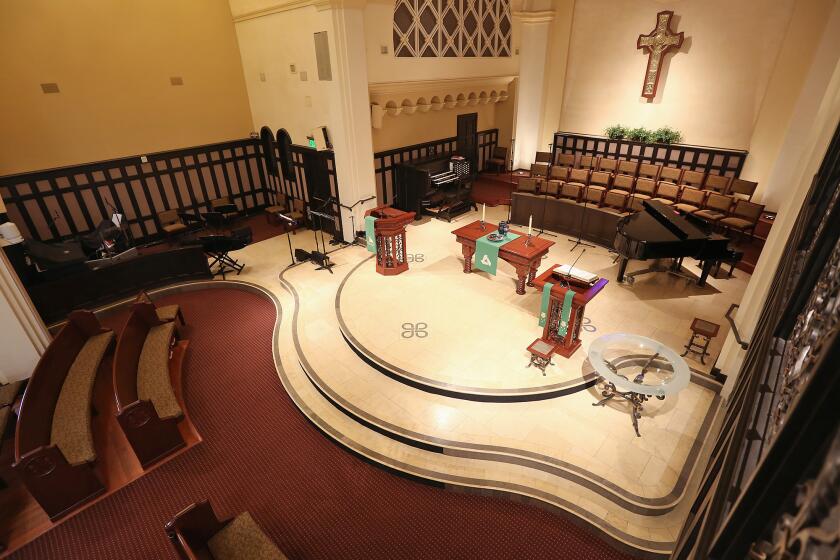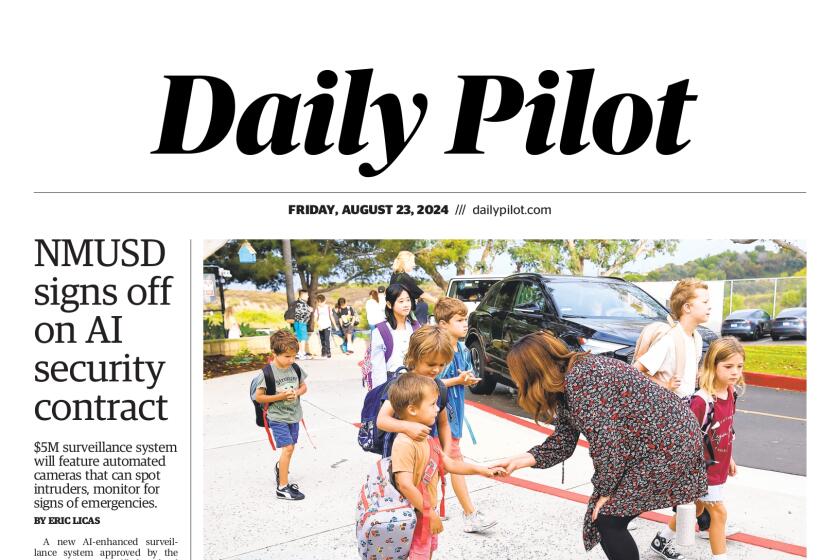Larry Moore
Bryce Alderton
Even though Dave Grant retired after last season, his influence on
Orange Coast College’s men’s crew team will still be felt.
That is if first-year men’s crew coach for the Pirates Larry Moore
has his way.
The 55-year old takes over for the legendary Grant and is the
first to admit that Grant’s shoes are too big to fill.
“I learned to row at OCC when Dave was my coach,” Moore said
Monday, two days before he and the team left for Boston for this
weekend’s Head of the Charles Regatta. “Everything I know (about
rowing) started with Dave and is the reason I’m back at (OCC).”
Moore rowed on OCC’s 1970 varsity-eight crew that battled the
University of Washington to a dead heat for the Western Sprints
title, and was also a member of Coast’s first boat to compete in the
Henley Royal Regatta in England.
Moore went on to row for two years at Cornell University in New
York and has coached rowing for 20 years. He served as the Pirates’
assistant crew coach for 11 seasons (1976-83) and again from 2000-02
and was the head crew coach at UC Irvine from 1983 to 1991.
Grant retired last summer after serving 38 years as OCC’s rowing
coach and served as the college’s president for six of those seasons.
His crews won more than 80% of their races against the likes of
four-year universities such as UC Berkeley, Stanford, UCLA,
Washington, Harvard and Pennsylvania.
Grant first mentioned to Moore that he wanted to retire two years
ago and Moore realized in November that Grant was ready to move on.
“I was very happy to see him stay on for last year but it became
apparent to me that he really wanted to move on and do other things
and he deserved the right to do some other things. I wouldn’t be
coaching anywhere else than at OCC. OCC has meant so much to me and
so many other people. It was a reasonable assumption I would take
over, it’s kind of how I found myself. It’s a lot of fun, make no
mistake about it and (the team) is all enjoying it.”
Moore wakes up each morning at 4 a.m. at his Trabuco Canyon home
to get to OCC’s boathouse on Pacific Coast Highway in Newport Beach
by 6 a.m. when the team arrives.
The crew starts by doing “land training” that Moore said can
involve anything from lifting weights and rowing on orgometers, which
simulate rowing, to running hills and jumping in the air as high as
they can out of the water.
After “land training” the crew hits the water for 1 1/2 hours to
row between 12 and 20 kilometers per day.
During the offseason the crew practices five days a week, but once
mid-February rolls around and the season is on the horizon in
mid-March, practices go to six days a week.
Coast is the only community college that fields rowing teams.
Linda Moeller has coached OCC’s women’s crew team for 10 years.
Rowing and coaching for many years, Moore knows the workouts are
tough and the “team” concept definitely applies to the sport, he
said.
“In rowing no one person can make up for anybody else,” Moore
said. “It’s almost like the weakest link theory. You have to have
eight people do exactly the same thing at exactly the same time. You
have to put your individualism aside and feel what’s going on in the
boat. You have to be sensitive to what everybody else is doing.”
As Coast prepares for the spring season, which begins March 22
against UCLA at Newport, Moore has strength in numbers with 11
returning varsity oarsmen to guide and teach the 40 novice varsity
oarsmen. Coast’s JV team is made up of five novice oarsmen, he said.
“(The novice oarsmen) have to learn the skill and get in good
shape,” Moore said. “We’re taking five or six novice oarsmen and
having them row in the second boat with varsity to bring everybody’s
level of expertise up. This year has been different with the
experienced oarsmen teaching the new oarsmen how to row. In the past
we’ve had two or three experienced oarsmen and this year we have 12
or more. You really learn when you try to teach somebody else how you
learned to row yourself.”
The team is in Boston this weekend to compete in the Head of the
Charles Regatta, the largest intercollegiate yacht race in the world,
that will attract oarsmen from colleges and clubs such as St.
Joseph’s, University of New Hampshire, Harvard, University of Albany,
William & Mary, the MIT Boat Club and the Charles River Rowing
Association, Moore said.
Crews race on a three-mile course and pass under six bridges in
what is termed a head race, where crews start in a single-file line
10 seconds apart, racing over a longer distance than the standard
2,000-meter Olympic course teams race during the regular season.
“If we can finish in the top five we’ve done very well,” Moore
said. “(The team) is upbeat about things so we’ll see. It’s more of
an experience thing because a lot of oarsmen from the West don’t get
to participate in something like this often.”
OCC will then race in the Newport Autumn Rowing Festival Nov. 3
and in San Diego Nov. 10, all leading up to the start of the season
in the spring.
The Pirates will compete in the Newport Regatta, against UC Irvine
and Long Beach State in Long Beach, April 12 and face off against
crews from across the nation such as Washington, Oregon State, Navy,
Princeton, Penn and Wisconsin in the San Diego Crew Classic April
5-6.
Moore, married to Judy with three children and a dog named “Dog,”
wants to teach the younger oarsmen how to row well and make them
enthusiastic about rowing in time for competition like OCC will face
in San Diego.
“We’re going to see some of the best crews in the nation in San
Diego,” Moore said. “The level of competition is extremely keen and
it will be tough rowing on all levels for us. I would like to see our
boats make the finals.” Moore enjoys facing the best.
“We like to be in events where the outcome is uncertain with the
opportunity to win or lose,” Moore said. “It wouldn’t be any fun
otherwise.”
But Moore concedes that Grant planted the seeds of winning, and a
host of other ideas Moore took and ran with.
“I never would have transferred to Cornell (where Moore majored in
European and medieval history and also rowed) if Dave didn’t open up
the possibilities for me,” Moore said. “The possibilities started
with crew and spilled into the classroom. Working hard is something I
took to the classroom as well. We are very much interested in
academics, being successful and transferring to other institutions.
We talk about (academics) quite a bit.”
Moore remembers when he first saw what would be the site for
Orange Coast’ scurrent boat house on Pacific Coast Highway in Newport
Beach in 1965.
“It was a sandlot when I first saw it with one light bulb on a
string, black widow spiders crawled around and wooden boats from the
1932 Olympics sat there,” Moore said. “When I started rowing in the
fall of 1969, storage for the boat house was a tent and then my
second year they built part of the permanent structure that’s there
now and then they added a second story in the late ‘80s.
“In 1999-2000 they completed the sailing facility.
“We’ve come a long way and we always thought we were extremely
fortunate and never underprivileged to have a great place to row.”
Moore raced on OCC’s 1971-72 crew team that was the first West
Coast crew team to race a foreign-made boat. They raced in the
“Karlische,” which was made in Germany.
All the latest on Orange County from Orange County.
Get our free TimesOC newsletter.
You may occasionally receive promotional content from the Daily Pilot.



